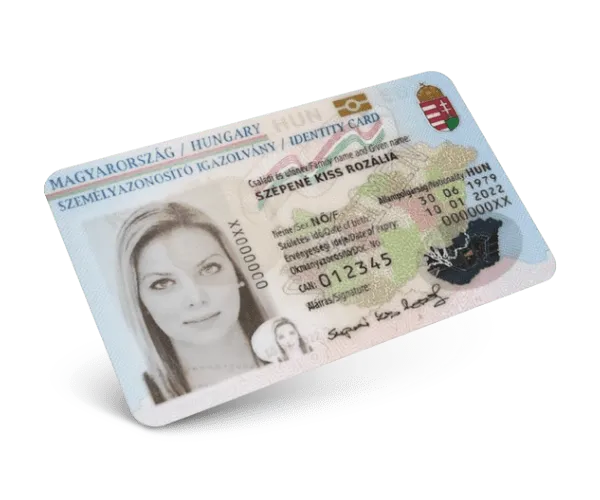Obtain Hungarian ID Card


How to apply
Only permanent ID cards may be sought, and only Hungarian citizens may apply for ID cards at the Consulate General. An application for a temporary ID card is not feasible.
In the event of a change in personal information, validity expiration, factual error, or loss, theft, damage, or destruction of the card, the permanent ID card may be renewed or replaced.
The ID card that is about to expire may be renewed no earlier than sixty days prior to the expiration date.
Only in-person applications for ID cards may be filed with a scheduled appointment. You can use the online reservation system to schedule appointments.
Making an appointment and using the online reservation system are free of charge.
Applicants for [personal] ID cards may be Hungarian nationals as well as “immigrants, established persons, refugees, or persons with subsidiary protection.” Hungarian nationals residing overseas have the ability to apply for an ID card as of January 2016. A temporary ID card is provided to eligible applicants for ID cards in the absence of an official document attesting to their identification at the time of application; however, a “participating authority or consular official” cannot provide a temporary ID card to an applicant for a permanent ID card. To obtain a permanent ID card, immigrants or “established persons, refugees, and persons with subsidiary protection” must apply; however, a protected person or refugee who has been awarded “an established status”
Documents Required to Apply for Personal ID Cards
The information in this section was taken from the KEKKH website:
A permanent personal ID card, “or any other valid document certifying … personal identity,” that is either valid or was valid in the year preceding the date of application, must be provided with an application for a personal ID card. Applicants who do not have such documents may instead provide the following:
- if they wish to use a doctor title and this doctor title is not registered in the personal data and address register, a document certifying entitlement to use the doctor title and, in the case of a doctor title awarded abroad, an official document certifying its naturalisation, or authentic copies of the former;
- in the case of Hungarian citizens returning from abroad with the intention to settle in Hungary or Hungarian citizens living abroad, official documents certifying their [PIN] and place of residence[;]
- in the case of immigrant or refugee applicants or those with subsidiary protection or established status, the immigration permit, the document certifying the refugee or subsidiary protection status or the established status, as well as the official document certifying the [PIN] and the place of residence[;]
- in the case of applicants with a refugee or subsidiary protection status – if it is the first personal ID card that is applied for – a photograph on the back of which the immigration authority shall specify the number of the authority decision recognising the person concerned as a refugee or a person granted subsidiary protection and certifying the fact that the photograph is identical with the person recognised as a refugee or protected person by a seal and a signature.
If an applicant lacks a valid personal ID card or any other document proving identity, a birth [or] marriage certificate should be provided with the application. Should applicants whose birth and/or marriage were registered in Hungary be unable to produce their birth or marriage certificate, the “administering authority” will contact the relevant registrars.
Applicants who live abroad and who acquired Hungarian citizenship “by naturalization or re-naturalization” must submit with their first application for an ID card a statement regarding their “natural personal identification data,” especially the name displayed on the official document, “certifying [that] their [PIN] and place of residence” is identical to the “name entered in the register or the naturalization certificate including their name change.”
“[I]ncapacitated applicants” may, in addition to the above documents, provide the court’s final decision establishing guardianship and must provide the “legally binding decision of the guardianship authority certifying representation before the law,” along with documents certifying the identity of the legal representative.
If the applicant is an “incapacitated” minor and only one of the parents is present at the moment of application, a statement made by the other parent or legal representative consenting to the issuance of a personal ID card for the applicant must also be provided. The statement of approval must either be issued in a “private document of probative value” or be made before:
- a notary public;
- a “district (metropolitan) office acting on behalf of the municipal and county government office in child protection and guardianship issues”;
- the head of a penitentiary facility;
- a consular official;
- “the designated government office”; or
- “the body keeping the register or a district office.”
The authority responsible for issuing the personal ID card may request the applicant’s PIN, as displayed on the official document “certifying the [PIN] and place of residence” (Hungary n.d.a).

